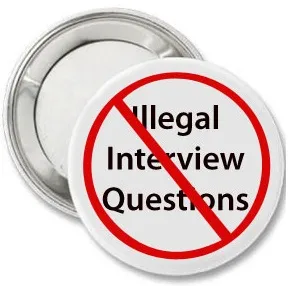
In the United States, federal and state laws prohibit prospective employers from asking certain questions that are not related to the job for which they are hiring; however, most interviewers are not deliberately trying to discriminate against job applicants. In fact, many illegal* interview questions come out unintentionally in a conversational tone. As an example, an interviewer could start the interview with some ice breaker type questions and say, “You have such an interesting name! What’s the origin?” Outside of an interview, this would be a pretty innocuous question; however, within an interview, it could be construed as trying to ascertain your nationality.
Personal information like your heritage, religion, age, and marital status can very subtly sneak into an interview. Here are a few more examples: y
Subject: Nationality
Illegal Questions: Are you a U.S. citizen? Where were you born? Is English your first language?
Legal to Ask: Are you authorized to work in the United States on a full-time basis? What languages do you speak and what is your proficiency level? (This can also be tested by the interview itself and/or a written exam.)
Subject: Marital/Family Status
Illegal Questions: Are you married? Are you planning to have children? How many kids do you have? What are your child care arrangements?
Legal to Ask: Would you be willing to relocate if necessary? Are you willing to travel as stated in the position description?
Subject: Disabilities
Illegal Questions: Do you have a disability? Have you had any recent illnesses or operations?
Legal to Ask: Are you able to perform the essential functions of this position with or without reasonable accommodations?
Subject: Age
Illegal Questions: How old are you? What is your birthdate? When did you graduate from college?
Legal to Ask: Are you over the age of 18?
Subject: Affiliations
Illegal Questions: What religious holidays do you celebrate? What clubs/organizations do you belong to?
Legal to Ask: Are you available to work Sundays (if the position notes this)?
What should you do if one of these questions gets asked during your interview? It can be a challenge to weigh your options quickly while you are still face to face with the interviewer. So, if there is an area which is of specific concern for you, try to prepare some possible responses. Here are four different options:
- Simply answer the question. Only choose this option if you are truly comfortable providing that information and don’t personally feel that it could cause an issue for you.
- Answer the question with a question of your own. You could say, “I’m happy to try and answer that question for you, but can you help me understand how that relates to this job first?”
- Don’t answer directly, but respond to the intent of the question. For example, if the interviewer asks if you are a U.S. citizen, you can respond by saying, “I think you are meaning to ask if I am legally authorized to work here and the answer is yes.”
- Refuse to answer the question. This last resort should only be utilized for a very egregious question.
Knowing in advance what kinds of illegal questions are apt to sneak into an interview and how you feel about answering them should be a part of your interview preparation. This can help you quickly diffuse an uncomfortable situation should it arise. Beyond what's legal, there are also disclosures that can make you feel uncomfortable discussing in a professional setting. We will be touching on some of these issues in future blog posts.
* Illegal interview questions, while not illegal in the strictest meaning, do have great potential to open a company or organization up to being held liable in a discrimination law suit.




